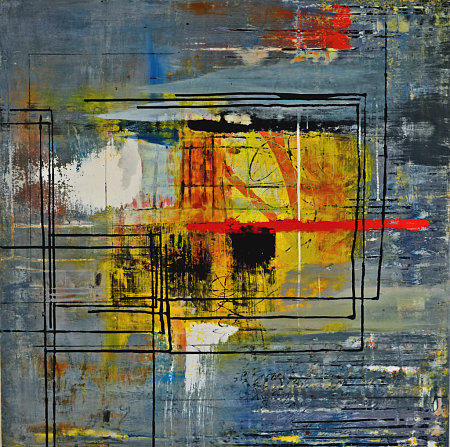
Survivor's Badge
The next evening I joined him in an abandoned water tower in bombed-out Trieste. What I saw in there disturbed me. He’d chosen as his avatar the Bedouin Trader, a robed Arab with dark skin and a protuberant nose. It was a stereotype of the kind you would never see in a contemporary game, an artifact from the early days of the Iraq War. Why had my father chosen it? Was it an accident? A joke? An early indication of senility? When I was seven years old, I’d gone to his medicine cabinet for an Advil and discovered his tube of prescription toothpaste for bleeding gums. I felt a similar repulsion now.
But I moved past it, as sons must, and started to play with him every evening. Once, toward the end of a prolonged and frustrating operation across bombed-out Chamdo, I recognized the sound of my father’s snoring, which jerked me back, Proust-style, to the sensation of childhood. It was nice. It was also nice to hear him respond to orders with his business-like “affirmative,” and it was nice to look across the smoking rubble and know that somewhere out there my father was crouching. I sought out his hideaways—a school bus amid the ruins of West Hartford, a tin shanty in radioactive Sao Paolo—to bring him ammunition and stick around for a few minutes of conversation. My father’s robed avatar would shift on his heels, scratch himself, and sigh, all in accordance with the animator’s intent.
At that time, I was playing gigs Tuesday and Thursday evenings at the Brass Missus with an older man named John Scuggs, who had done two tours in Fallujah and two in the Swat Valley. With John on the stand-up bass and me on the viola, we embarked on angry, formless journeys in front of a sympathetic audience of ex-soldiers. (The VA hospital was two blocks away.) Historically, I’d declined to stick around after the shows. The veterans had earned an emotional forthrightness that I felt both frightened by and unworthy of. But now I stayed to collect anecdotes for my father. I knew he would enjoy hearing about the kid from LeFrak City who claimed he could smell IEDs— they smelled like spent fireworks, he said—or about Gordo, who first thing he did state-side was go to the airport’s Taco Bell, eat thirteen bucks of the stuff, then take a seven-hour nap right there on the table. Others confirmed that this sounded right: nobody wakes a man in uniform. All this—the listening, the re-telling—made me feel guardedly optimistic about myself. I wagered that my sympathies were expanding in an important way.
But I was bothered by that Survivor’s Badge. It was a round, blue testament to my father’s caustic and self-protective style of playing, and I didn’t like to see those elements of his personality rewarded. I was also embarrassed by the comfort that he took from it. His brand of pride was both pathetic and familiar. I wanted rid of it. I wanted to kill him.
One death, just one, would cause him to lose the Badge. Of course I didn’t want to hurt him in real life; that thought had never entered my head. But this type of small murder, with its smaller consequence, corresponded precisely to the amount I wanted him to suffer.
It was a conundrum. I took it to John Scuggs and asked for his veteran’s opinion. He gave it a minute of silent thought before voting no.
“Let youth be your revenge,” he said.
And, truth be told, I’d like the story to end there. That tension—to kill or not to kill—has a nice resonance and reflects accurately the situation with my father. But real life doesn’t allow resonant moments to resonate for very long. One evening, I found him huddled in a river bed in bombed-out Glasgow. The graphics in Kill Shot are bad: the same cluster of petunias and gladiolas repeated itself around his clean, white robes. I aimed my Luger at him. I fired.
In the silence that followed, I knew his screen had gone red and that my name had appeared in black letters beneath the words “Killed By.” My plan was to wait for a few seconds, then say it was an accident and apologize. But because he said nothing, I said nothing.
He re-spawned; we finished out the match. Our nightly games became weekly games then grew more sporadic still, until finally they ceased altogether.
